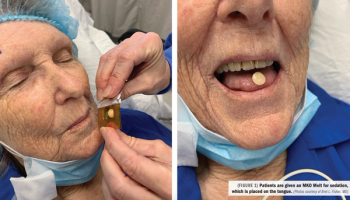
Pfizer explores options for OTC drug unit
New York-Pfizer Inc. is looking to boost shareholder earningsby studying options-including a sale or spin-off-forits over-the-counter (OTC) drug unit, which includes the Visineline of eye drops.
New York-Pfizer Inc. is looking to boost shareholder earnings by studying options-including a sale or spin-off-for its over-the-counter (OTC) drug unit, which includes the Visine line of eye drops.
Earlier this year, the company announced that it was exploring options for Pfizer Consumer Healthcare, a nearly $4 billion business unit, which includes a broad range of product lines. Pfizer Vice Chairman David Shedlarz told investors the company expects to make a decision during the third quarter in 2006.
"We're looking at strategic alternatives," said Pfizer spokesman Daniel J. Watts. "We're certainly entertaining offers, particularly when market valuations for this type of business are quite high."
"At this point we're looking at the entire business," Watts said. "We're not going to cherry-pick products to sell off. If you want our Listerine business, you'll have to take our Rolaids business. We have a nice portfolio of products and well-established names that have a lot of value."
John Boris, managing director at Bear Stearns, a leading investment firm, said tax liabilities might play a factor in whether Pfizer opts to spin off the business or sell it. A buyer would be responsible for paying billions in taxes, McKinnell told investors, but no taxes would be owed in a spin-off scenario.
"He (McKinnell) is not going to have a fire sale on the business, but my sense is they're going to do it in a very prudent fashion here," Boris said. "If Pfizer could command a price of $14, $15, $16 billion, maybe a sale makes sense.
"However, if it's in the $11- to $12-billion range, maybe a spin-off makes sense," Boris continued.
The unit saw sales increase 10% last year, and it accounts for 7.5% of Pfizer's $51 billion in annual revenues, according to the Associated Press.
Boris said Colgate and GlaxoSmithKline were reportedly interested in exploring a purchase. Both have big OTC portfolios that could be complemented by Pfizer's, but for different reasons. Colgate, for instance, might see Pfizer's Listerine oral care product line as complementing its toothpaste products. The Listerine line "accounts for a substantial part of the profitability of the franchise," Boris said. Colgate could introduce the oral care products more globally through its distribution channels, he added.
However, GlaxoSmithKline might see the OTC unit as a profit generator to provide cash flow for its research and development pipeline, Boris said.
Pfizer's OTC eye-care products are of less importance to buyers, he explained.
"My sense is the ophthalmology piece is a much smaller piece of the whole," Boris said. "There are GI (gastrointestinal) products like Zantac and Rolaids, a whole host of oral care products, antihistamines and decongestant products like Benadryl and Sudafed; I don't want to say (the eye-care product line) is unimportant but (the unit is) very diversified with a broad depth of products across a lot of therapeutic areas, of which eye care is an important piece."
Selling or spinning off the consumer products division follows Pfizer's effort to focus on its prescription pharmaceuticals, Boris said. He pointed to other divisions-including its Schick-Wilkinson Sword shaving products business; its Adams confectionery business; and hip, joint, and heart valve companies-that Pfizer has sold in recent years.
"The trend here over the last 5 or 10 years is to concentrate largely on pharmaceutical prescription products," Boris said.
Newsletter
Don’t miss out—get Ophthalmology Times updates on the latest clinical advancements and expert interviews, straight to your inbox.





























